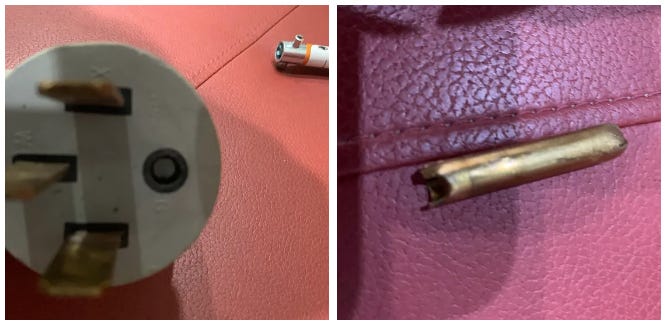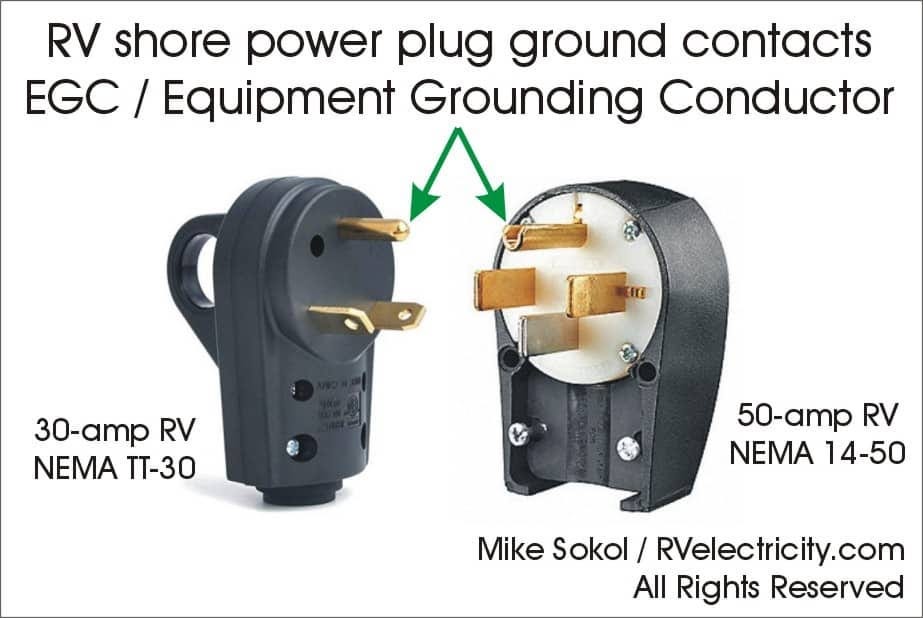RV “hot-skin” basics...
I had a lot of questions about hot-skin voltage at the Frog Rally this week..
Everyone,
I spent 3 days teaching RVelectricity Seminars at the Forest River Owner’s Grounp (FROG) Rally in Goshen, IN this week, and there were a lot of questions about hot-skin shocks and why they happen. Here’s a typical question and my observations about why hot-skin voltages happen.
Dear Mike,
We recently purchased a pop-up camper. We set it up in the driveway to check things out. My daughter got a shock when she was standing on the grass and touched the camper door. I checked it out and realized that the extension cord had a bad ground wire. I hooked up an extension cord with a good ground wire, then the camper did not shock me. Exactly what’s happening here? — A Shocked Reader
Dear Shocked,
The thing to understand is that anything plugged into a power outlet has at least some AC leakage current to its chassis. And if there’s not some way to get rid of this current, then it turns into a voltage on the “skin” (actually the chassis) of the appliance or RV. Even your smartphone will develop around 60 volts on its “skin” when plugged into a wall charger since there’s no ground pin on the charger plug. But the amount of leakage current in that case is so small (typically less a 1/1000 of an ampere or 1 mA) that you don’t feel it.
Why are ground connections important?
However, an RV has a lot of internal connections and appliances, all of which leak a little current to the chassis, and that current is additive. So any RV without a grounded plug can easily leak 1 to 10 mA of current to its chassis, and that would normally be shorted to ground via the ground pin on the shore power cord. If that safety ground connection is eliminated either by a non-grounded extension cord or outlet with a missing ground, then the chassis (skin) of the entire RV can become electrified with voltage.
Now, sometimes this is a harmless tingle if there’s not a lot of available current or you’re standing on dry ground. But if your feet are wet and there’s significant leakage current from a failed appliance or shorted wire inside of your RV (10 mA to 50 amperes) then you can be severely shocked or even electrocuted (killed) when touching anything metal on your RV and the wet ground. So every RV needs to be connected (bonded) to a proper safety ground wire in the shore power plug.
Never accept feeling a shock!
If you feel any kind of shock, or measure more than 5 to 10 volts between the RV chassis and a ground rod in the earth, then that safety ground has been compormised somehow, and the RV can develop a hot skin voltage and turn deadly at any time without you knowing exactly when.
So NEVER hook up shore power to an RV without a properly grounded extension cord, and NEVER ignore feeling a shock, since that’s a hint the RV’s safety ground is no longer connected properly.
More on this later!
Let’s play safe out there… Mike









My rv plug got hot and melted at campground. I must not have twisted it tight enough. To save the trip i cut the end of the shore cord off and pulled the rv plug off and hard wired it in with wire nutts and covered with electrical tape. Two days later checking things for return trip I touched the bar that secures the ramp door and got a shock. Checked with meter to ground had 30 volts. Because I didn’t know about hot skin I left it . Got home and plug trailer in just like at campground hard wired and no voltage coming off the same places. I’m thinking the pedestal at campground was bad and questioning if that could caused the plug to melt.